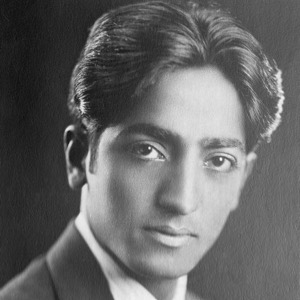
Jiddu Krishnamurti (1895 – 1986) was an Indian philosopher, speaker and writer. As a young man he renounced the role bestowed on him as a world teacher, as he did not wish to belong to any organization of a spiritual kind or have any allegiance to any nationality, caste, religion, or philosophy. He spent the rest of his life travelling the world, speaking to large and small groups and individuals about his own insights into the human mind. He wrote many books, among them The First and Last Freedom, The Awakening of Intelligence, and Krishnamurti’s Notebook. Many of his talks and discussions have been published as well. Krishnamurti also founded several schools around the world based on his views on education.

Quotes by Jiddu Krishnamurti…
When experience is complete, there is no residue — that is the beauty of life.
What is needed, rather than running away or controlling or suppressing or any other resistance, is understanding fear; that means, watch it, learn about it, come directly into contact with it. We are to learn about fear, not how to escape from it.
We are second-hand people. We have lived on what we have been told, either guided by our inclinations, our tendencies, or compelled to accept by circumstances and environment. We are the result of all kinds of influences, and there is nothing new in us, nothing that we have discovered for ourselves: nothing original, pristine, clear.
Freedom from the desire for an answer is essential to the understanding of a problem.
The constant assertion of belief is an indication of fear.
When you call yourself an Indian or a Muslim or a Christian or a European or anything else, you are being violent. Do you see why it is violent? Because you are separating yourself from the rest of mankind. When you separate yourself by belief, by nationality, by tradition, it breeds violence.
Tradition becomes our security, and when the mind is secure it is in decay.
One is never afraid of the unknown; one is afraid of the known coming to an end.
There is no end to education. It is not that you read a book, pass an examination, and finish with education. The whole of life, from the moment you are born to the moment you die, is a process of learning.
It is no measure of health to be well adjusted to a profoundly sick society.

